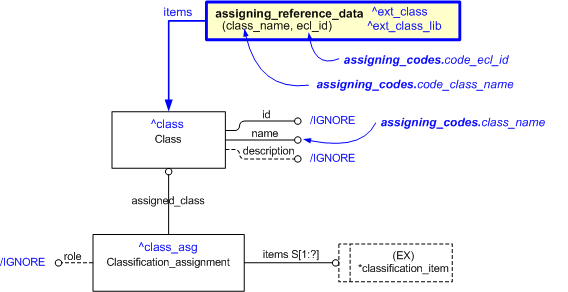
| Template:— assigning_code (asg_code) Capability:assigning_codes |
Date: 2009/06/10 09:53:39 Revision: 1.20 |
This section specifies the template assigning_code.
NOTE The template has been defined in the context of the capability assigning_codes which provides an overall description of the relevant parts of the ISO 10303-239 information model and a description of related templates.
NOTE An explanation of a template and the associated instantiation path is provided in the Template overview section.
This template describes the assignment of codes for classification to entity instances within a data set, where the class being used is not defined in a Reference Data Library, i.e. the class can not be referenced using the External_class_library entity. This is e.g. often the case for codes being used in legacy applications.
NOTE The templates assigning_code and assigning_reference_data can be used interchangeably, i.e. wherever the template assigning_reference_data is being used the assigning_code template can be used instead, and vice versa. The usage of the respective template is dependent upon whether the class being used is defined as Reference Data or not.
NOTE For DEXlib edition 1, the identification of the class (i.e. the identification of the code) is done using the Class.name attribute. The Class entity instance is then classified as being a member of a classification system using the assigning_reference_data template. This will be superseded in DEXlib edition 2, where the Class.name will be set to '/IGNORE' and the identification instead will be provided using the assigning_identification_with_no_organization template. The assigning_identification_with_no_organization template includes both the identification of the class (i.e. the code) and its classification.

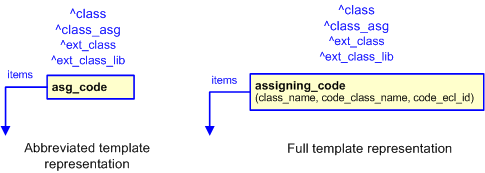
target
is the parameter to which the
Class
is bound.
target
is the parameter to which the
Classification_assignment
is bound.
target
is the parameter to which the
External_class
is bound.
target
is the parameter to which the
External_class_library
is bound.
| Entity in path | Value | Inherited from |
| Class.id | '/IGNORE' | — |
| Class.description | '/IGNORE' | — |
| Class.name | @class_name | — |
| Classification_assignment.role | '/IGNORE' | — |
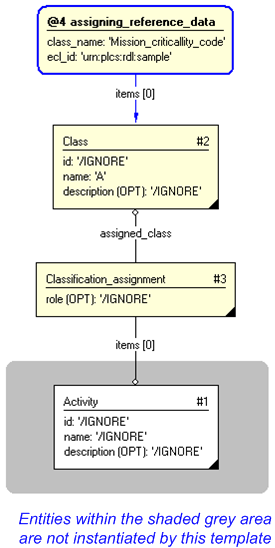
#1 = ACTIVITY('/IGNORE','/IGNORE','/IGNORE',$); #2 = CLASS('/IGNORE','A','/IGNORE'); #3 = CLASSIFICATION_ASSIGNMENT(#2,(#1),'/IGNORE'); #5 = CLASSIFICATION_ASSIGNMENT(#7,(#2),'/IGNORE'); #7 = EXTERNAL_CLASS('/NULL','Mission_criticallity_code','/IGNORE',#8); #8 = EXTERNAL_CLASS_LIBRARY('urn:plcs:rdl:sample',$);
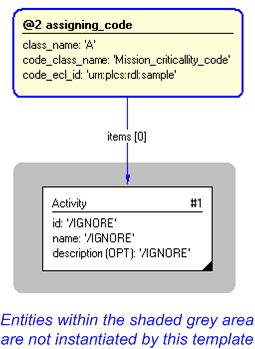
NOTE this characterization is optional.
Descriptions can be assigned to the Class using the assigning_descriptor template, e.g. in order to provide a description for the exchanged code.
This has been raised as issue, GYL-3, against ISO 10303-239. The EXPRESS schema has been modified in DEXlib (Long form: dexlib/data/schemas/ap239_arm_lf.exp, short form: dexlib/data/schemas/ap239_arm_sf.exp). These changes will be made to ISO 10303-239 as a Technical Corrigendum at some stage.
NOTE this characterization is optional.
Document references can be assigned to the Class using the assigning_document_reference template, e.g. in order to provide a reference to a document containing the description for the exchanged code, or a description of the entire encoding system.
This has been raised as issue, GYL-3, against ISO 10303-239. The EXPRESS schema has been modified in DEXlib (Long form: dexlib/data/schemas/ap239_arm_lf.exp, short form: dexlib/data/schemas/ap239_arm_sf.exp). These changes will be made to ISO 10303-239 as a Technical Corrigendum at some stage.
NOTE this characterization is optional.
Identifications can be assigned to the Class using the assigning_identification template, e.g. in order to provide a name for the exchanged code.
This has been raised as issue, GYL-4, against ISO 10303-239. The EXPRESS schema has been modified in DEXlib (Long form: dexlib/data/schemas/ap239_arm_lf.exp, short form: dexlib/data/schemas/ap239_arm_sf.exp). These changes will be made to ISO 10303-239 as a Technical Corrigendum at some stage.
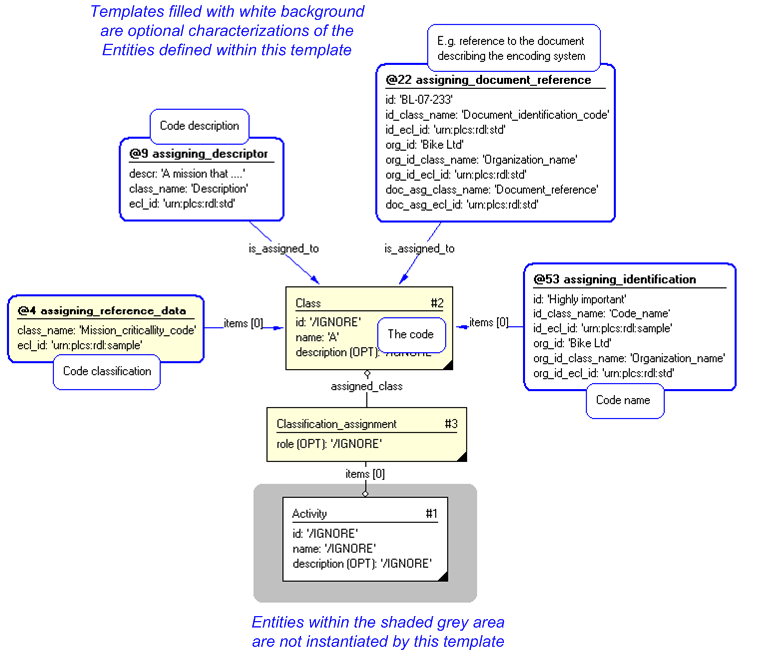
© OASIS 2010 — All rights reserved